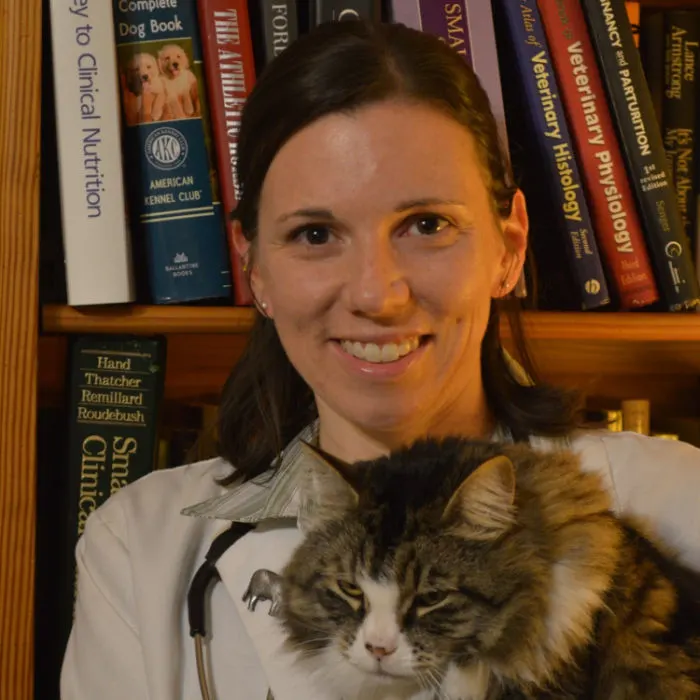Let’s say your pet rabbit has given birth to mini bundles of joy, or you’ve just rescued newborn rabbits. Perhaps you’re simply curious. Whatever your reason, you’re now wondering: when do baby rabbits open their eyes?
Teeny baby buns are the most adorable ever. And you might wish you could hold and nurture them — but that’s exactly what you shouldn’t do
. Instead, you want to leave them in their mother’s care until they can fend for themselves, as these tiny fur balls are fragile for the first few weeks and domestic rabbits – much the same as wild rabbits – are more than capable of raising their young without human intervention.
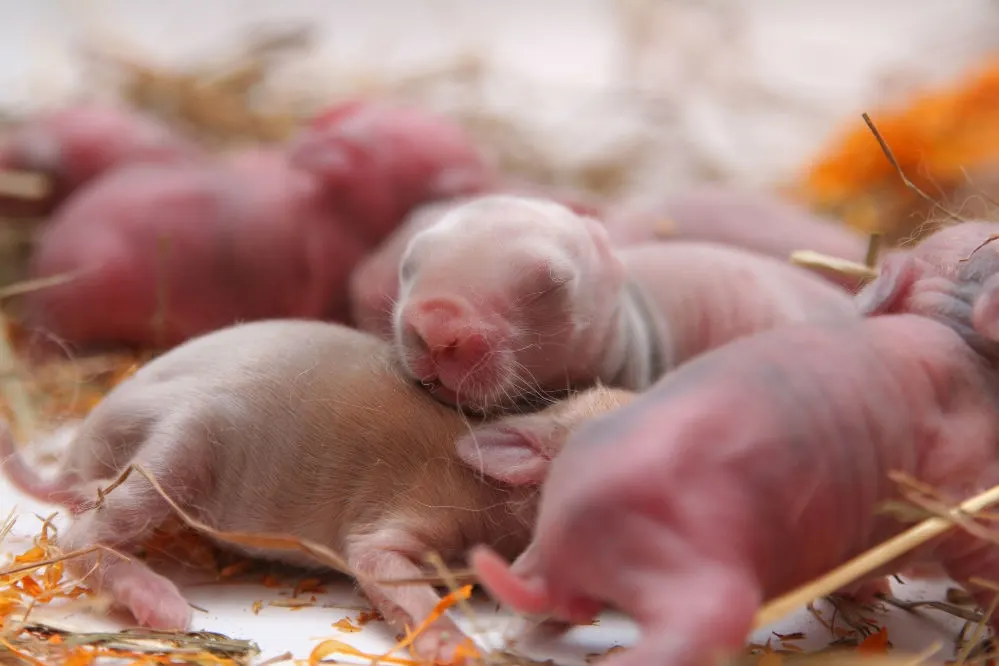
However, there are cases where a litter of kits is motherless, and this is where you’ll need all the help you can get. Knowing what to do when this happens is essential for raising infant rabbits. It helps indicate when you can start handling kits, what and how to feed them, and more.
Also, if you have rescued wild baby bunnies, the following information will help you look after them in the best way possible. So if you’re feeling a bit stuck, you can start by knowing when these fur babies open their eyes.
Why are newborn kits’ eyes closed for days after birth?
You’re probably anxiously waiting for your young rabbits to open their cute little eyes, but it’s just not happening. That’s because newborn baby rabbits are born blind. However, this is not as bad as it sounds; their eyes are closed shut for a few reasons.
Simply put, your furry babies aren’t ready to explore the world just yet. So let’s analyze these reasons below:
Their eyes aren’t fully developed yet
Juvenile rabbits’ eyes are not fully developed by the time they are born. Since this is the case, their eyes will be super fragile. Newborn rabbits’ eyes are closed to protect their delicate appendages while they’re still developing.
This will prevent any harmful substances like debris, dust, and even hay from entering their eye sockets. Too much wind and bright light can also damage a kit’s eyes. These active little cuties also wriggle around uncontrollably, so the chances of harming each other’s eyes by accident are also lowered while they remain closed.
It’s their best chance of survival
Kittens need to be born with closed eyes so that the mother rabbit can look after them in the best way possible. This means the best way to keep them alive and protected from predators. See, nesting somewhere dark and hidden makes more sense when the kits’ eyes are closed so that mommy can go off on errands without worrying about her babies leaving the nest.
In the wild, the mother rabbit leaves the nest for the most part of the day to forage and only returns about once or twice to feed her litter. This little routine would probably not work if the kitten’s eyes were open.
How long does it take for newborn bunnies’ eyes to develop?
Many studies on the dimensional growth of the rabbit eye have been conducted. However, there is still not enough information on the postnatal development of the eye.
All that researchers could identify is that the eyes grew (the scleral thickness and cellular density increased) exponentially within the first week after birth. This growth also spiked about two weeks to 28 days later when the infant kit’s eyes would have opened.
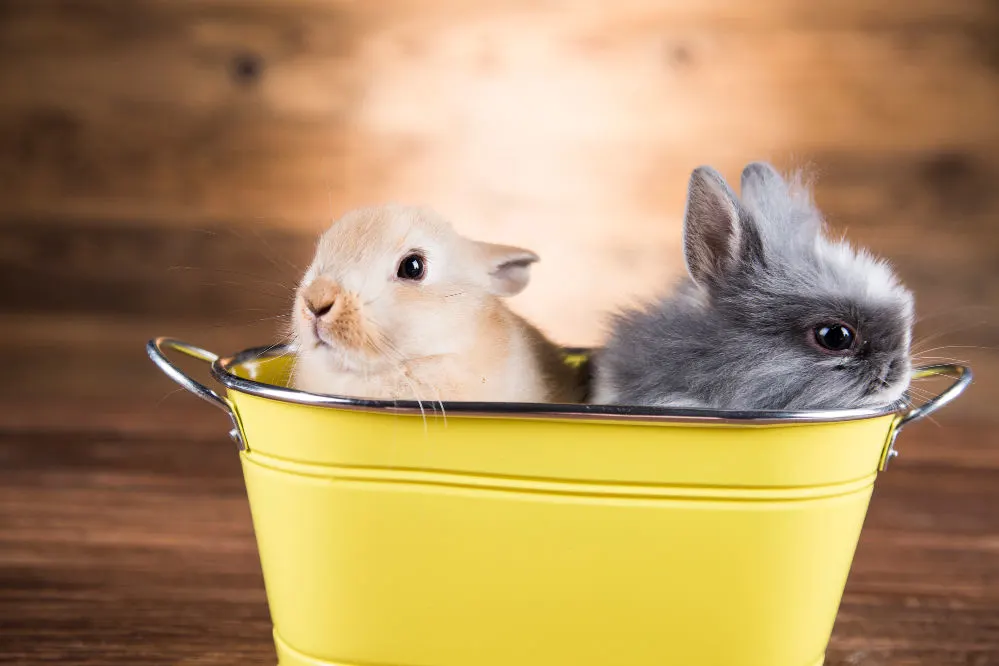
When do rabbit kits open their eyes?
The average time for a baby bunny’s eyes to open is roughly seven to ten days of age. By the time they are three weeks of age, they’ll start weaning off the mother rabbit. Kits with fur on their body and open eyes are old enough to care for themselves regardless of the breed of the rabbit.
You’ll want to keep a close eye when this happens, though, as it can tell you a lot about how to look after baby bunnies. For example, gentle handling of these furry babies can start when they’re about ten days old. If you’re uncertain of their age, you can wait for their eyes to open. Similarly, a kit’s open eyes means they will start feeding on solid food pretty soon.
Related Read: Do rabbits have periods?
Why do some infant rabbits’ eyes open a lot later?
Your litter of baby fur balls should start opening their eyes at 10-12 days. However, if they haven’t opened by days 14 – 16 or they’re not opening all the way, you may have to watch out for nest box eyes, eye infections or other issues. Don’t fret — most of these are curable with medical treatment, but here are some signs to look out for:
Eye infections
Healthy kits’ eyes should be clear and bright with pink eye tissue when they open. You can examine their eyes by pulling the lids up or down to check for signs of infection or illness. If you notice red or very pale eye tissue, that shows the possibility of an underlying health issue.
Red or inflamed eye tissue with discharge could indicate an eye infection. This is when you should visit your vet so they can treat these symptoms and find the underlying health problem.
Conjunctivitis
Conjunctivitis is an eye infection also called the ‘pink eye’ that could cause your pet bunny not to open their eyes fully. Off you go to the vet for treatments.
Abscesses
It’s not uncommon for baby kits to contract a bacteria called Pasteurella right after birth. This bacteria can cause abscesses in the form of pus-filled lumps, blisters, sores, and cysts. It’s also possible for an abscess to develop around the eye area, which makes it uncomfortable for them to open their eyes.
If you notice little bumps around your baby rabbit’s eyes, then it could be a sign of an abscess. In this case, you need to act quickly and get to the vet, as this is a severe condition that could be life-threatening.
Nest box eyes
Nest box eyes, on the other hand, are not caused by internal health factors. Instead, it’s caused by environmental factors. Things like debris, urine, or hay can enter their eye socket while nesting. This results in crusty and tightly sealed eyes that will take a bit longer to open.
You can prevent this by keeping their nesting box clean. If you do notice these signs, you can head to the vet, and they’ll likely rinse the baby bun’s eyes with a sterile saline solution to remove debris, mucus, or foreign matter.

How do I make it easier for my baby bunny to open their eyes?
Firstly, you want to prevent environmental substances from entering your bunny’s eyes as they slowly begin opening them. Any foreign object, dirt, or debris may enter their eyes, cause an infection, and slow down the process of opening them fully. To prevent this, you want to keep the litter’s nesting box as clean as possible by tidying it up on a daily basis.
If you notice any signs of an infection or abscess, visiting your vet would be the best thing you can do. Internal health issues cause these, so there’s nothing really that you can do to help your bunny without medical treatment. Your vet will provide you and your little munchkin with the right solution to help fix any eye problem, which will likely include lubricating or antibiotic eye drops or cream.
Last but not least, having the right environment for the healthy development of a kit’s eyes is essential. Keep your litter’s nest box in a dark and enclosed space, ensuring that no wind or bright lights enter. Doing this ensures that your baby bunnies don’t develop blindness.
Should I try to open my baby rabbit’s eyes?
As mentioned above, it’s possible that your newborn rabbit’s eyes do not open by the twelfth day. While this can be scary and worrisome, never (emphasis on never) try to force your kit’s eyes open. This will cause way more damage than good.
Forcing baby rabbits’ eyes open can damage their facial nerves and the entire eye area, as these organs may not be fully developed yet. In the long run, this misstep could lead to blindness, paralysis, and even death.
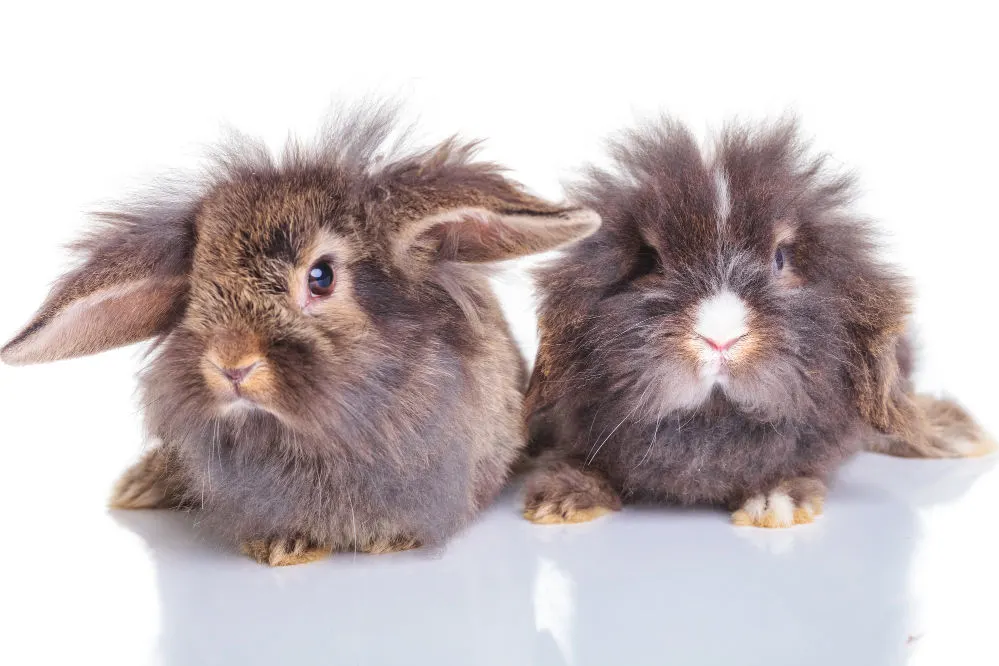
You can help by consulting a vet if you notice their eyes are taking a while to open. Your vet will advise you on what to do next.
Are some infant rabbits born with open eyes?
A kit born with open eyes is extremely rare. However, there are some cases where this is possible. This would mainly be due to a genetic defect caused by the Max Factor gene. Let’s have a closer look:
The Max Factor Gene
First things first, the Max Factor gene affects dwarf rabbits only. This recessive gene is also distinctive from the Pituitary Dwarfism (peanut) gene in rabbits. Lastly, both parents must carry the Max Factor gene for it to show up in their litter.
A kit born with this defect will often have fully open eyes or eyes that are slightly open. Unfortunately, open eyes, even if it’s just slightly open, will lead to blindness. The Max Factor kits are sometimes called “frog” because of the other deformities linked to this defect.
However, there could also be a possibility when kits are born with open eyes and no deformities. If this happens, you can turn to your local vet to help with the eye issue. The vet will likely lubricate the eye area and use antibiotic eye drops to prevent any eye infection or any other problems that could develop.
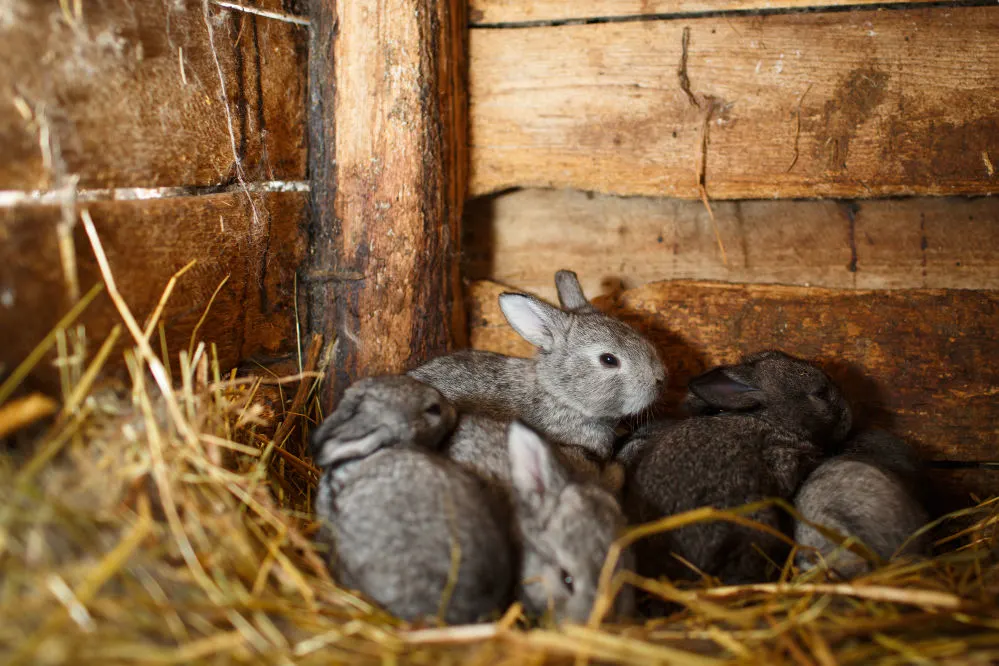
Growth phases of newborn baby rabbits
Let’s zoom in on a rabbit’s life cycle and when they open their eyes, as it plays quite a significant role. The newborn part can be pretty tricky for brand-new rabbit owners. Knowing what to expect and when to expect it makes life a little easier.
- Weeks one to two: The first week is the most vulnerable state. Their fragile bodies cannot regulate heat yet, and they need sufficient milk to survive. Their soft fur starts growing out almost immediately, and their eyes stay closed until about day seven to ten. By day nine, they should have enough fur to stay warm and will start moving their cute little ears on the twelfth day.
- Weeks three to five: This is when you can start referring to your newborn bunny as a kitten or kit (think of it as a toddler stage). You can now begin to help with the weaning process by providing Alfalfa hay at week three. From four weeks onwards, kittens become more aware of their surroundings and move around more. Now you can introduce solid food and more hay for them to nibble on.
- Week eight: Your bunny should be fully weaned at this point. Eating solid food is now a regular part of their diet, and they’re also ready for a new home. At this point, your baby rabbit starts taking care of itself.
Your rabbit’s eyes are open, so what now?
Okay, so now your kit’s eyes are open; what should you do next? First of all, you can now take a deep breath and stop stressing. Your babies have made it through their most fragile state and will continue to grow stronger.
All you have to do now is to keep the nesting box clean and your fur babies well-fed. Provide fresh hay, like alfalfa, and clean water every day. Eventually, you can start introducing various veggies, alfalfa pellets, and leafy greens for them to munch on.
In addition to the solid food, continue giving your tiny pet rabbits kitten milk replacer to help them grow healthy and strong.
Final thoughts on when baby rabbits open their eyes
Now that you know everything about when baby rabbits open their eyes, you can be a better rabbit owner. Raising newborn bunny rabbits is no joke. It can be a handful if you don’t do some research first.
But the best way to learn is through trial and error. The most important thing is to keep the surroundings quiet and dark so that your furry family can adapt to their new world with ease and comfort. You’ve got this!
Steph Dyson is a travel journalist by trade but a lover of all small pets. She’s been a pet mum to everything from gerbils to guinea pigs, rabbits to hamsters, and fish to dogs of all shapes and sizes. She wants to share her years of experience with small pets and make Small Pet Guides the go-to website for pet owners seeking information and care advice.

